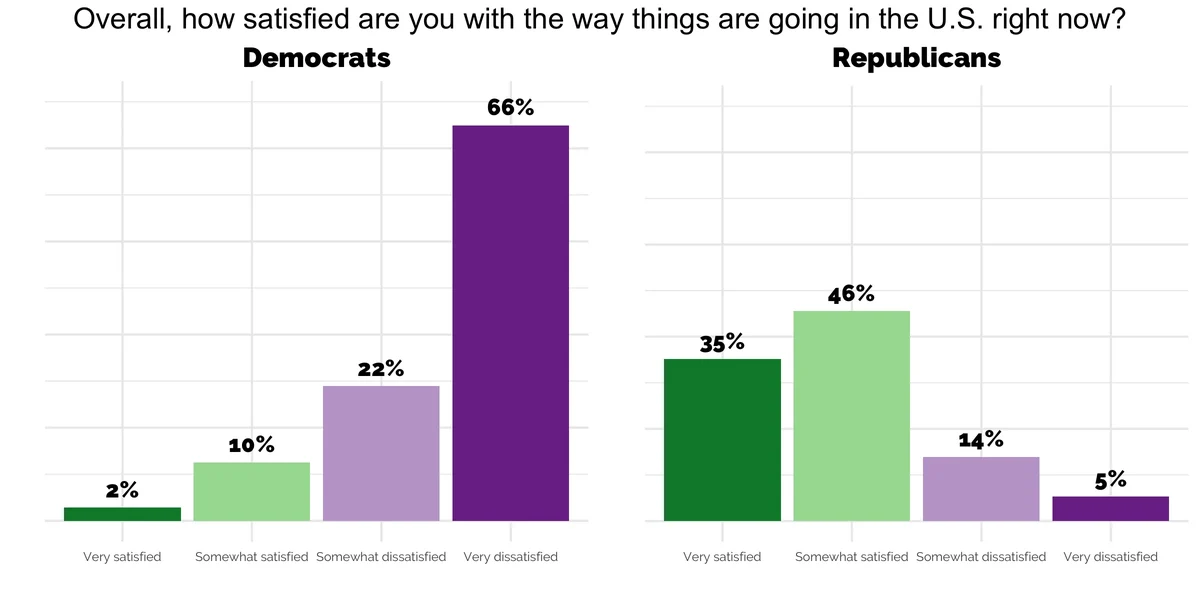The latest edition of the CBS News/YouGov Battleground Tracker was conducted on June 21-22 with interviews of 2,063 U.S. adults. It shows a deeply polarized nation. Overall, Americans are split on the state of the nation. 59 percent say that they are dissatisfied with "the way things are going in the U.S. right now" while 41 percent say that they are satisfied. But these views are so colored by partisan loyalties that it seems like Democrats and Republicans inhabit different countries. 88 percent of Democrats are dissatisfied (with a remarkable 66 percent "very dissatisfied") compared to only 19 percent of Republicans.

A significant fraction of the public is deeply disillusioned. By a 41-36 margin, respondents said they would like to see Democrats win control of Congress rather than Republicans, but almost a quarter (24 percent) say "it doesn't matter." The country is split into three groups: Republicans who think things are swell, Democrats who think it's a disaster, and the rest who are disaffected and don't like either party.
In this round of polls, CBS chose to focus on three crucial Senate races. We conducted separate polls in Arizona, Florida and Texas. It's still early (Arizona has not yet held its primary), but we have some early indications of the challenges facing Democrats as they try to wrest control of the Senate from Republicans. Currently Arizona seems to lean toward the Democrats, Florida is a toss-up, and Texas leans toward the Republicans. To have any chance of controlling the Senate, Democrats must hold seats like Florida (one of ten Democratic seats won by Trump in 2016) and pick up at least two Republican held seats, like Arizona or Texas. However, if Democrats were to win Arizona and lose Florida, it would be one step forward and one step back. On the other hand, in a "blue wave," Democrats would not only hold a toss-up like Florida and gain Arizona, but pull off an upset in Texas. As of today, that seems unlikely.
Arizona: Promising opportunity for a Democratic pickup
In Arizona, three candidates are seeking the Republican nomination to replace retiring U.S. Senator Jeff Flake. The moderate "establishment" candidate, U.S Representative Martha McSally, is is in a close race with former state Senator Kelli Ward, a tea party favorite backed by Steve Bannon. However, Ward is splitting the far right vote with Joe Arpaio, the former Sheriff and convicted felon who was pardoned by President Trump. The winner will face likely Democratic nominee U.S. Representative Kyrsten Sinema.
Our poll indicates that if the election were held today, Sinema would win fairly easily. She leads McSally by 41-34, Ward by 43-35, and Arpaio 46-28. McSally does a better job of holding marginal Republican voters than Ward. Among Republicans who have favorable views of John McCain, McSally leads Sinema 62-11 while Ward wins a bare majority 51-17. It is, however, a sign of how the Republican party has become the party of Trump that only 20 percent have a favorable opinion of McCain. Retiring Senator Jeff Flake fares even worse, with only 16 percent of Arizona Republicans rating him favorably.
Although Trump won Arizona in 2016 by a 49-45 margin, neither Trump nor his policies are very popular here. Arizonans disapprove of Trump by a 53-47 margin. 71 percent favor DACA, 47 percent consider the border wall to be "a bad idea," 56 percent want stricter gun control, and 56 percent favor a national universal health care program. This is one of the Democrats' best chances for picking up a Republican Senate seat in 2018.
Based on interviews of 1,001 Arizona registered voters, conducted June 19-22, 2018.
Florida: A tight race, a must-win for Democratic chances of a Senate majority
In Florida, incumbent Democratic Senator Bill Nelson faces a strong challenge from Republican Governor Rick Scott. In our latest poll, Scott holds a slight lead 42-40. The outcome will depend upon turnout. Scott holds a 4 point advantage among voters who say they "definitely" plan to vote, while Nelson leads by 8 points about those who "probably" plan to vote and 14 points among those who say "maybe."
Trump is more popular here than in Arizona with 52 percent approving and only 48 percent disapproving. There is stronger approval for a border wall -- only 43 percent think it is "a bad idea." There are, however, some issues that Nelson might be able to take advantage of. 72 percent of Florida voters are in favor of DACA and 58 percent are in favor of a national universal health care program. And, of course, it was here where 17 high school students were killed at Marjory Stoneman Douglas High School. 59 percent of Floridians favor stricter gun control laws and they prefer Nelson by a wide margin (58-24). Nelson is in a close race for reelection. Democrats must hold it if they are to have any chance of controlling the Senate in 2019.
Based on interviews of 1,002 Florida registered voters, conducted June 19-22, 2018.
Texas: Still a longshot for Democrats
Incumbent Republican Ted Cruz leads Democratic U.S. Representative Beto O'Rourke 44-36 in our latest poll. Texas is not as red as it used to be, but it will take a rather large blue wave for the Democrats to pick up this seat. Not impossible, but definitely a long shot.
Cruz's popularity is only so-so for an incumbent at this stage, with 52 percent approving and 46 percent disapproving. Trump's popularity is about the same (51 approving, 49 percent disapproving). Long forgotten among Republicans, apparently, is "Lyin' Ted" who now embraces his former nemesis. Over 80 percent of Texas Republicans now approve of both. However, among Republicans, affection for Trump is stronger than for Cruz: 56 percent "strongly approve" of Trump, compared to only 46 percent for Cruz.
On issues, Texans aren't as conservative as the conventional wisdom would have it. 43 percent consider the border wall to be "a bad idea," 53 percent are in favor of stricter gun control, and 54 percent favor a national universal health care program. Over 40 percent of registered voters are non-white, but lower turnout rates among blacks and Latinos disadvantage Democratic chances here. 73 percent of registered whites say they will "definitely vote" in 2018, compared to 55 percent of registered Latinos and 51 percent of registered blacks.
Based on interviews of 1,030 Texas registered voters, conducted June 19-22, 2018.
Full results for the national, Arizona, Florida and Texas polls.










